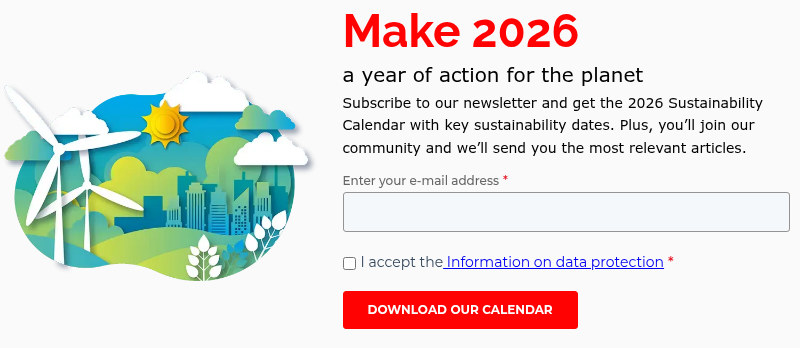Annual calendars are full of all kinds of ephemera, saints and onomastics. But one type of celebration that’s gaining increasing traction in the agendas of institutions and in social media is the International Days.
These, along with the desire to highlight certain issues at least once a year, have led us to prepare this Sustainability Calendar: a key diary for 2026 in which we gather the most important international and world days for the sustainable development of the planet.
Why are International Days so important? A priori, it can seem somewhat esoteric, celebrating a World Day for Bees or one for Migratory Birds. But these days generate visibility and reflection on crucial issues. In the case of bees, their inclusion in the calendar seeks to raise awareness about the problems we will face if action is not taken to mitigate bees’ fight for survival, such as the sustainable initiative to install plants for bees at bus stops. Thanks to this day in the calendar, many people now realize what will happen if bees disappear, not only in relation to their species, but in connection with virtually all the planet’s ecosystems.
As such, the objective of International and World Days is to inform public opinion about a determined problem and convince governments to develop initiatives to tackle them. Examples are International Forests Day and World Energy Efficiency Day.
Most of them are proposed by countries at the United Nations General Assembly and approved by consensus in the Organization. Normally the issues at hand are related to principal UN action areas, such as maintaining peace, respecting human rights, tackling climate change, and conserving the planet. Indeed, in its resolutions the Assembly explains the reasons why it has selected a certain day or date. On other occasions, it is one of the UN agencies, such as Unesco, Unicef or the World Health Organization, which presents the proposal.
The UN approves these actions, not only to raise awareness and sensitize the population about world problems like climate change, but also to advise countries on initiatives they can take to mitigate some of the issues drawn attention to by these dates. On the International Day for Biological Diversity, for example, the Organization invites its member to ratify and sign the Cartagena Protocol on Biosafety, an act which is then publicized on the web page of the Convention on Biological Diversity.
Then we have the other international days invented by society which have become so popular they end up being institutionalized, like St Valentine’s Day.
Each day in the calendar has its celebration, but UN days highlight specific issues and make them the protagonists of an annual global agenda. In 2026, the focus is spread across three big themes linked to sustainable development: the role of volunteering, the recognition of women in agriculture, and the protection of ecosystems and key communities for biodiversity conservation.
On the one hand, the UN has proclaimed 2026 as the International Volunteer Year for Sustainable Development, an initiative aimed at raising awareness about and strengthening the contribution of volunteers – formal and informal – in achieving the Sustainable Development Goals and promoting policies, alliances and community actions across the world.
2026 is also the International Year of the Woman Farmer, with the aim of bringing to the fore the role of women in agricultural and food systems and speeding up solutions to remove barriers facing them (access to land, financing, training and technology).
And finally the UN has also declared 2026 to be the International Year of Rangelands and Pastoralists, emphasizing the relevance of such ecosystems that occupy a significant portion of the Earth’s surface, as well as the pastoral communities who ensure climate resilience, food security and biodiversity conservation.
Taking these days together, the message for 2026 is clear: progress toward a more sustainable future needs us to recognize those who shoulder the change at ground level (rural and shepherd communities, women farmers, volunteer networks) and create the conditions for greater, more visible and better supported impacts.
